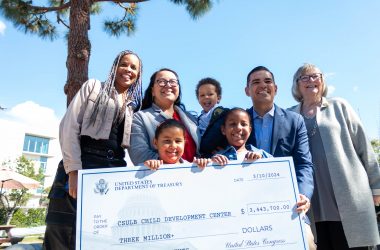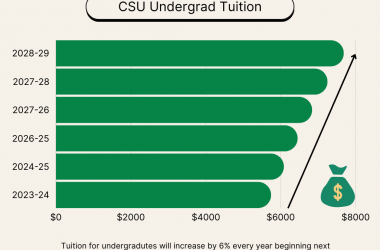Associated Students, Inc.’s Recycling Center has accomplished significant carbon dioxide emission reductions by providing recycling services for the CSULB and Long Beach communities.
Over a year span, the center recycled 1.7 million pounds of material. Center coordinator Lee Johnson compared the center’s green house gas reductions to a year-long removal of 449 passenger vehicles from the road. The impact of recycled paper materials amounted to the equivalence of saving 8,000 trees.
Lisa Harris, city of Long Beach’s recycling specialist, says the Recycling Center is the “cleanest and most organized” recycling facility in Long Beach.
The CSULB Recycling Center averages 120 people bringing recyclables in daily. Monthly, the center recycles over 500,000 cans and bottles from on-campus facilities and events.
The center, started by students in 1970, is self-supporting and open to the public. It is currently run by a staff comprised of one full-time coordinator and eight part-time student assistants. The center hopes to raise money for site improvements, including replacing the old office trailer and installing running water and toilet facilities.
Canco Recycling on South Street averages over 400 people recycling daily and has recycled 72 million pounds of materials in a year’s time.
The ASI Recycling Center accepts materials that many other local recycling centers do not, such as scrap metal. The center is state-certified, providing a place for people to receive deposits back on beverage containers.
In addition to providing recycling services, the center also coordinates events to raise environmental awareness in the Long Beach community and provides educational tours of the recycling center.
In August, the center held its first ever Kid ECO Fair to raise children’s awareness of recycling. About 850 children from local day camps attended the fair to learn about different environmental issues.
Last year marked CSULB’s first student move-in recycle program. Teaming up with other campus administrative organizations, they recycled over 7,000 pounds of cardboard and 40 cubic yards of styrofoam accumulated from new students moving into the dorms.
The center’s goal is to have a recycling container next to every one of the more than 400 trashcans on campus. The recycling cans cost about $450 each, and the center is seeking grants to help fund the cost of adding more on-campus recycling cans.
Residential recycling guidelines, according to the city of Long Beach environmental services bureau:
- Mixed Paper
- DO NOT INCLUDE: soiled paper products, such as diapers, pizza boxes and used paper tissues, napkins or towels
- Cardboard (must be broken down)
- DO NOT INCLUDE: soiled cardboard
- Cans (residue must be wiped/rinsed clean)
- DO NOT INCLUDE: can with poisonous contents, scrap metal, insecticide/pesticide cans, aluminum foil
- Plastic (any residue must be wiped/rinsed clean)
- DO NOT INCLUDE: fast food containers, toys, garbage bags or caps/lids
- Glass (any residue must be wiped/rinsed clean)
- DO NOT INCLUDE: pyrex, mirrors, light bulbs, pottery, window glass, ceramics, plates or cups
For more detailed descriptions of recyclable materials go to http://www.longbeach-recycles.



